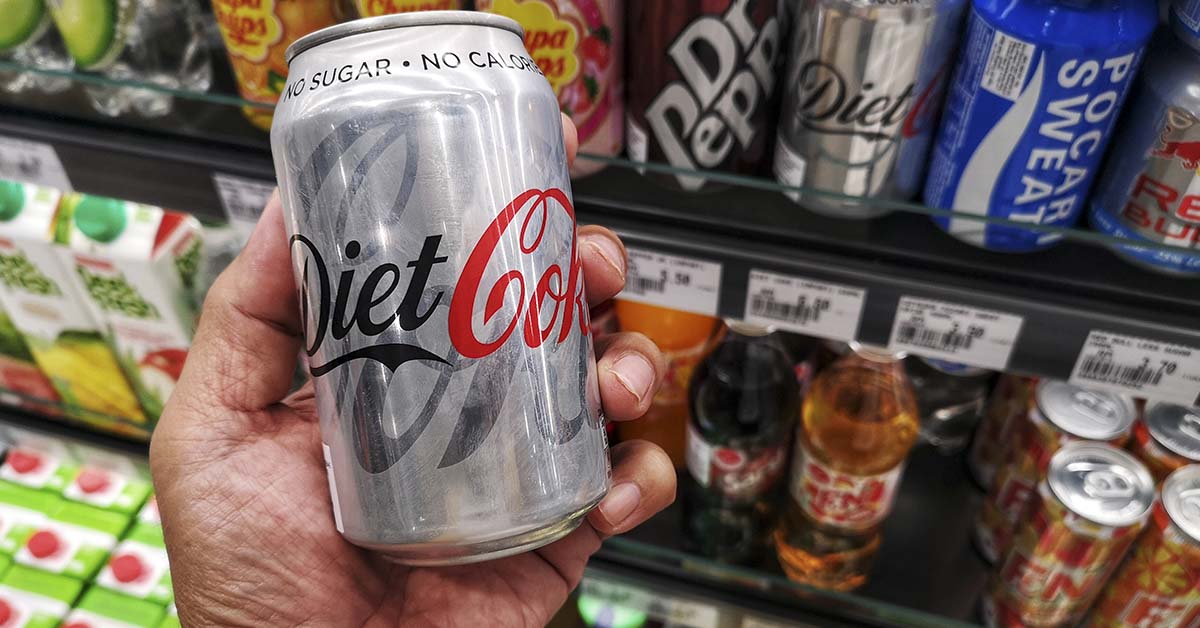Are you an avid user of artificial sweeteners? Perhaps you use them in your morning and afternoon coffees, prefer “sugar-free” products over their sugar-containing originals, and perhaps you enjoy a diet soda from time to time. If this is sounding like an apt description of you, new research may give you pause. After a 10-year-long study, scientists have found that artificial sweeteners found in products such as diet coke are raising your risk of heart attack, among other potentially fatal health problems.
Artificial Sweeteners Might Increase Your Heart Attack Risk, Scientists Discover
Artificial sweeteners are everywhere. You can find them in cereals, ketchup, yogurts, diet soda drinks, and more. Scientists invented them in response to the realization that we, as a society, we’re consuming far too much sugar than what was good for our health. Unfortunately, what started out as something that was supposed to better our health might be having the opposite effect. Experts recently found that people who consume just 78 mg per day of artificial sweeteners – about half a can of diet pop worth – were more likely to have a heart attack. It doesn’t stop there – regular artificial sweetener consumers were also more likely to have a stroke. In fact, a stroke was a more likely scenario than a heart attack was. (1)
The Study
The study took place over the course of 10 years and included 103,388 participants. These people, whose average age was 42, logged everything that they ate for three days. French National Institute for Health and Medical Research researchers examined this data. They were able to see which products, and therefore which artificial sweeteners, the people were consuming. The scientists then followed the participants over the next nine years. They found that those who consumed artificial sweeteners were 9% more likely to have cardiovascular disease and 18% more likely to have cerebrovascular disease. (2)
The researchers say that this just adds to the growing body of research that shows that artificial sweeteners truly are not good for us. This includes studies that show that artificial sweetener use actually leads to weight gain, despite its reason for invention being the opposite. Other studies have linked it to inflammation and high blood sugar. The same set of researchers who worked on this study also found that artificial sweeteners increase risk of cancer.
Other independent experts, however, say that we should be so quick to jump to conclusions. They say that while we know the dangers of sugar, the relationship between artificial sweeteners and heart problems is still not overly clear. According to them, bigger, more longer-term studies are necessary to confirm this claim.
Read: The Poorly-Understood Role of Copper in Anemia
The Study’s Limitations
The results of the study showed that 37% of the participants included artificial sweeteners in their diet. Those people’s average intake of artificial sweeteners was around 42.5mg. This is roughly the amount in a table-top sweetener packet, or 100ml of a diet drink. The researchers also found that the 37% who consumed artificial sweeteners tended to be younger than those who didn’t and also were more likely to be overweight. Not only that, but they were more likely to be inactive, smoke, consume more dairy and diet drinks, eat more salt, red meat, and processed meat products, and more likely to follow a diet.
Naturally, other than age, all of these factors are those that increase your risk of heart attack and stroke. The researchers said, however, that they took into account this knowledge. For this reason, they are saying that artificial sweeteners should not be considered safe for consumption in place of regular, plain-old sugar.
A further discussion of the study and its limitations are highlighted below in a post by Dan Feldman, MS, RDN, a Registered Dietitian Nutritionist.
Which Were The Worst Sweeteners?
The researchers found that aspartame was the most likely to increase your risk of stroke. Aspartame is found most often in low or no-sugar drinks, ice cream, and salad dressings. Still, however, many experts are saying that the data is too flawed or not conclusive enough to be able to make such strong claims against artificial sweeteners. The study is, after all, observational, relying on people’s ability to report on their own food intake accurately and honestly.
Truthfully, your best bet is to do what most doctors and dietitians will tell you to do: Focus your diet on healthy, whole, natural foods. Vegetables, fruits, whole grains, and lean proteins. Eat as little “out of a box”, aka processed foods, as possible. Then, every once in a while, feel free to treat yourself to something that doesn’t fit that category. Maybe it’s a burger and fries or perhaps it’s your mom’s famous chocolate chip cookies. Either way, rather than focusing your diet on “diet” foods, just eat natural, unprocessed foods most of the time and you won’t have to worry about any of this.
Keep Reading: Drink these types of coffee to live longer, study says
Sources
- “Warning as diet cola drinkers are told that the popular beverage is increasing their chance of having a STROKE.” Daily Mail. Bridie Pearson-Jones. September 12, 2022.
- “Artificial sweeteners and risk of cardiovascular diseases: results from the prospective NutriNet-Santé cohort.” BMJ. Charlotte Debras, et al. September 7, 2022.

